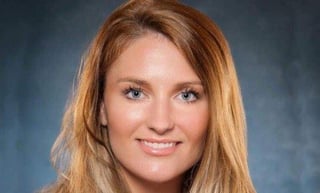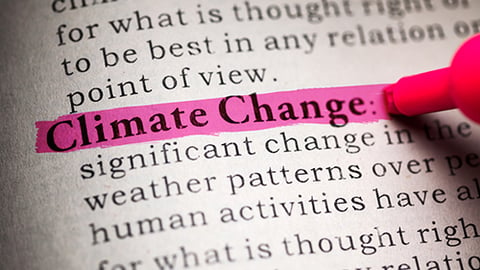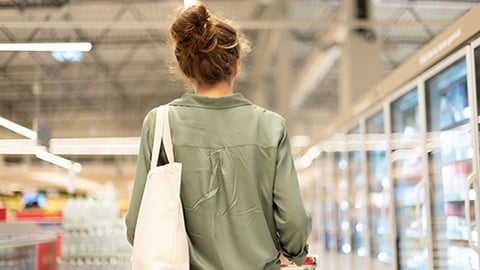How Ahold Delhaize USA Plans to Reach Net Zero
In the wake of Ahold Delhaize’s Nov. 15 Investor Day, during which the multinational retail conglomerate discussed, among other things, the furtherance of its goals to help people and the planet, Progressive Grocer had the opportunity to find out about the sustainability efforts of Ahold Delhaize USA (ADUSA) from Brittni Furrow, VP, health and sustainability at the company.
Progressive Grocer: Define what it means to be a net-zero business. What does that mean specifically for ADUSA?
Brittni Furrow: In the simplest terms, net zero means reducing emissions across all activities as much as possible and offsetting the remaining emissions as a last resort. For Ahold Delhaize USA companies, moving to net zero is part of our overall commitment to make a local impact with a greater purpose. By taking a leadership position in the drive toward net zero, we can make a vast difference for the future of our world and the local communities our brands serve.
PG: What specific sustainability targets is ADUSA working toward?
BF: In terms of net zero, all Ahold Delhaize companies – in the U.S. and globally – have committed to net-zero carbon emissions across own operations by 2040 (scope 1 and 2) and to becoming net-zero businesses across the entire supply chain, products and services no later than 2050 (scope 3). Ahold Delhaize has joined the Business Ambition for 1.5°C in partnership with the Science Based Targets initiative and the U.N.-led campaign “Race to Zero.”
More broadly, this past year, Ahold Delhaize USA companies unveiled new health and sustainability goals as part of a detailed purpose-driven strategy to enable customers to make healthier choices, create greater product transparency, eliminate waste and take bold climate action, all in support of developing a more sustainable food supply chain. The net-zero commitment builds upon the climate action commitments announced earlier this year.
PG: How does the company plan to get there, and in what time frame? Please provide information on specific initiatives already in the works or about to be undertaken.
BF: To achieve the scope 1 and 2 commitments for own operations by 2040, Ahold Delhaize companies will continue to improve our own operations by:
- Replacing or retrofitting refrigerator systems with lower greenhouse-gas alternatives and minimizing leakage;
- Accelerating the switch to renewable power;
- Building and remodeling stores in the most energy-efficient way, including installing LED lighting, adding doors to refrigerators and improving insulation;
- Switching to low-carbon heating initiatives, including heat pumps and district heating;
- Converting both our light and heavy transportation fleet to zero-carbon alternatives, including battery electric vehicles, and leveraging route optimization technology and an improved fill mechanism to reduce overall energy use; and
- Applying an internal carbon price model into investment proposals.
To achieve the scope 3 commitments across the supply chain by 2050, Ahold Delhaize companies will focus largely on partnering with farmers in this transition, by incentivizing sustainable change through longer-term contracts with concrete environmental requirements, and co-investments on their farms.
PG: How do ADUSA’s efforts benefit the local brands in the United States, and the company as a whole?
BF: Enhancing sustainability is a win-win-win. It’s good for consumers, it’s good for the planet, and it’s good for business. In many cases, Ahold Delhaize USA brands have served their communities for decades. Part of the lasting impact our brands have is the care they take for their local communities. Our brands are trusted neighbors in their communities during the good times, and in the challenging ones. Part of the trust that customers place in our brands is that our businesses function in a way that is sustainable for more decades to come.
As each of the brands continues its omnichannel evolution journey, health and sustainability will be an integral part, whether that’s ensuring customers can easily find nutritious options in stores or online, or moving toward net-zero carbon emissions to protect the planet.
PG: What’s in the pipeline for sustainability in the years ahead?
BF: In the years ahead, emissions will continue to be a key area of focuses as we get to work on the new net-zero commitments. In addition, other key areas of focuses will include product transparency and the digitization of sustainability. Consumer interest in the health content and sustainability aspects of products is continuing to grow. That’s why we have in place a relationship with Partnership for a Healthier America to measure healthy products using our Guiding Stars nutritional guidance system across the total store and why there is a tremendous amount of work going on with our private-brand offerings on reformulation and removal of unnecessary ingredients.
Similarly, consumers want to know where their products are coming from and their sustainability impact as they move through the supply chain. Our brands have partnered with HowGood to not only provide sustainability scores for products in stores but have also extended this to online.
We expect that enabling consumers to transparently access information about their products’ nutrition and sustainability across all channels is only going to continue to grow in importance. This is an area we are actively engaging [in] and will continue to invest [in] to ensure consumers can access healthy, sustainable products as they shop Ahold Delhaize USA brands.
Ahold Delhaize USA, a division of Zaandam, Netherlands-based Ahold Delhaize, operates more than 2,000 stores across 23 states and is No. 10 on The PG 100, Progressive Grocer’s 2021 list of the top food and consumables retailers in the United States.











